
The Gay Cockade
From the moment Jimmie Harding entered the office, he created an atmosphere. We were a tired lot. Most of us had been in the government service for years and had been ground fine in the mills of departmental monotony.
But Jimmie was young, and he wore his youth like a gay cockade. He flaunted it in our faces, and because we were so tired of our dull and desiccated selves, we borrowed of him, remorselessly, color and brightness until, gradually, in the light of his reflected glory, we seemed a little younger, a little less tired, a little less petrified.
However, in his gay and gallant youth, there was a quality that recalled earlier times. We felt he should have worn a feather in his cap and a cloak instead of his Norfolk coat. He walked with a little swagger and stood with his hand on his hip as if his palm pressed the hilt of his sword. If he ever fell in love, we told one another, he would undoubtedly sing serenades and apostrophize the moon.
He did fall in love before he had been with us a year. His love affair was a romance for the whole office. He came among us every morning glorified; he left us in the afternoon as a knight enters upon a quest.
He told us about the girl. We pictured her perfectly before we saw her as a little thing with a mop of curled brown hair, an oval face, pearl-tinted, and broad, blue eyes. He dwelt on all her slight perfections—the brows that swept across her forehead in a thin black line, the transparency of her slender hands, the straight set of her head on her shoulders, the slight halt in her speech like that of an enchanting child.
Yet she was not in the least a child. “She holds me up to my best, Miss Standish,” Jimmie told me; “she says I can write.”
We knew that Jimmie had written a few things, gay little poems that he showed us now and then in the magazines. But we had not taken them at all seriously. Indeed, Jimmie had not taken them seriously himself.
But now he took them seriously. “Elise says that I can do great things. That I must get out of the Department.”
Getting out of the government service would have seemed a mad adventure to the rest of us. None of us would have had the courage to consider it. But it seemed natural that Jimmie should fare forth on the broad highway—a modern D’Artagnan, a youthful Quixote, an Alan Breck—!
We hated to have him leave, but he had consolation: “Of course, you’ll come and see us. We’re going back to my old house in Albemarle. It’s a rotten shack, but Elise says it will be a corking place for me to write. And you’ll all come down for weekends.”
I am sure we felt it was good of him to ask us, but none of us expected that we should ever go. We had a hunch that Elise wouldn’t want the deadwood of Jimmie’s former Division. I was content to think of Jimmie happy in his old house. But I never really expected to see it. I had expected nothing except the day’s work, my dinner at the end, a night’s sleep, and the same thing again in the morning.
Yet Jimmie got all of us down, not long after he was married, to what he called a housewarming. He had inherited a few pleasant acres in Virginia, and the house was two hundred years old. He had never lived in it until he came with Elise. It was in rather shocking condition, but Elise managed to make it habitable by scrubbing it very clean and taking out everything that was not in keeping with the oldness and quaintness. The effect was bare but beautiful. There were many books, a few oil portraits, mahogany sideboards and tables, four-poster beds, candles in sconces, and branched candlesticks. They were married in April, and when we went down in June, poppies blew in the wide grass spaces and honeysuckle rioting over the low stone walls. We all felt as if we had passed through purgatory and entered heaven. I know I did because this was the kind of thing I had dreamed of, and there had been a time when I wanted to write.
Read or download Book
Temple Bailey
Irene Temple Bailey (February 24, 1869 – July 6, 1953) was a famous American novelist and short story writer.
Beginning around 1902, Temple Bailey contributed stories to national magazines such as The Saturday Evening Post, Cavalier Magazine, Cosmopolitan, The American Magazine, McClure’s, Woman’s Home Companion, Good Housekeeping, and McCall’s.
In 1914, Bailey wrote the screenplay for the Vitagraph Studios film Auntie, which filmed two of her novels. Publishers Weekly also determined that three of her books were among the bestselling novels in the United States in 1918, 1922, and 1926.
Bailey never married. She died at her apartment in Washington, D.C., on July 6, 1953. Her obituary in the New York Post estimated that her novels had sold three million copies, making her among the best-paid writers in the world and that Cosmopolitan had once given her $325,000 for three serial novels and a group of short stories.
Bibliography
- Judy (1907)
- Glory of Youth (1913)
- Contrary Mary (1914)
- A Girl’s Courage (1916)
- Adventures in Girlhood (1917)
- Mistress Anne (1917)
- The Tin Soldier (1918) – No.8 for 1919 in the U.S.
- Trumpeter Swan (1920)
- The Gay Cockade (1921)
- The Dim Lantern (1922) – No.5 for 1923 in the U.S.
- Peacock Feathers (1924) – made into a motion picture
- Holly Hedge and other Christmas stories (1925)
- The Blue Window (1926) – No.10 for 1926 in the U.S.
- Wallflowers (1927) – made into a motion picture
- Silver Slippers (1928)
- Star in the Well: a Christmas story (1928)
- Burning Beauty (1929)
- Wild Wind (1930)
- So this Is Christmas (1931)
- Little Girl Lost (1932)
- Enchanted Ground (1933)
- Radiant tree and other stories (1934)
- Fair as the Moon (1935)
- I’ve Been To London (1937)
- Tomorrow’s Promise (1938)
- The Blue Cloak (1941)
- Pink Camellia (1942)
- Red Fruit (1945)






